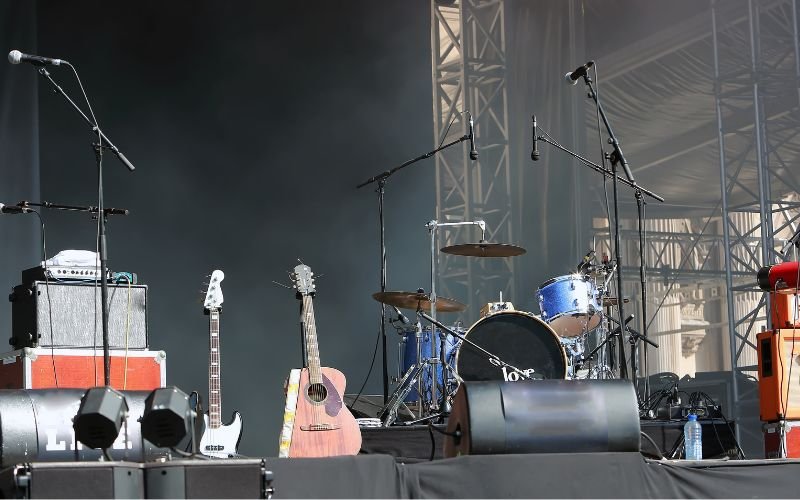6 tips for playing your instrument on stage
Do you dream of performing live with your band? Have you already played on stage, but would like to improve your next performance? Whether you play guitar, bass, piano, violin, drums or any other musical instrument, performing on stage can't be improvised. As well as helping to reduce stress, good preparation before a concert enables you to anticipate any problems with sound, stage feedback and technical set-up. Discover our tips for playing your instrument on stage with confidence and without false notes, giving your audience a memorable concert!
Rehearse with your band as if you were on stage
Tip no. 1: to play your instrument well on stage, practice and rehearse, whether alone or with your band members. Rehearse in the studio, but also in live conditions to ensure the quality of your playing on stage (adjusting the volume of each instrument, amp power, checking the accessories you'll need on the big day, etc.). Ideally, arrange to come and rehearse on the stage where you'll be performing. This will enable you to familiarize yourself with the stage environment and adjust your playing to the acoustics of the room, the stage layout and the position of each musician.
Here's a tip: ask about the layout of the stage beforehand by drawing up a detailed technical rider, so that you and the technical team are on the same wavelength when it comes to sound and equipment requirements for the concert.
🎶 If you're using pre-recorded music tracks or accompaniment sequences, practice with them regularly so that you're in perfect sync with the different tracks. Musician's tip: use visual cues or sound signals to help you stay in sync with the tracks throughout the concert.
Control the power of your amplified instrument on stage
When you play on stage with an amplified instrument such as a bass or guitar, the power is higher and the instrument may have different sound characteristics than when played acoustically. As a musician, you need to learn how to control the power of your instrument in order to maintain a balanced and pleasing sound for the audience. This may involve adjustments in the way you attack the strings, the pressure you exert on the keys or the effects pedals you use.
Take the time to master the power of your amp-connected instrument before you go on stage, and set the sound balance correctly.
Familiarize yourself with the operation of onstage monitors and adjust the monitor levels to hear yourself and other musicians clearly. Use stage monitors strategically to guide you through the concert and keep in sync with the rest of the band.
Check the volume of each instrument during soundcheck
The soundcheck is the period before the concert when the sound engineers adjust sound levels and check that the technical equipment is working properly. Take advantage of this time to fine-tune the sound of your bass or guitar and make sure everything is working properly.
During the soundcheck, work as a team with the sound engineer to fine-tune the settings of your accessories: amp, effects pedals, microphone... Test different settings to find the sound that best suits your playing style and your band's musical genre. This will ensure, for example, that your guitar sounds the way you want it to and blends harmoniously with the other instruments.
Also make sure you have good monitoring on stage during the soundcheck. Monitoring allows you to hear your performance clearly, as well as that of the other musicians in the band. If the monitoring isn't optimal, the sound engineer is there to adjust levels and equalization for clear, accurate sound feedback.
💡 On-stage monitoring is generally managed by the sound engineer from the control room. It is performed using In-Ear systems (in-ear headphones), or through on-stage monitor speakers.
Warm up before going on stage
Before going on stage, take the time to warm up and prepare your muscles and joints. Yes, being a musician is more athletic than you might think!
Start with gentle stretching to loosen your muscles and improve your mobility. Next, practice exercises specific to your instrument to strengthen the muscles used in performance. Depending on the instrument you play, you can work on your finger agility on the piano, go over the chords you're going to play on the guitar, or practice simple hand-foot coordination exercises on the drums.
🎙️ In addition to your musical talents, do you also sing? Remember to warm up your vocal chords before you go on stage! Here are a few tips to help you take care of your voice and sing your heart out.
Check your equipment before your concert
Make sure that all instruments, amps, microphones and other accessories are in good working order to prevent any technical problems that may arise during the performance of a song. Take the time to check cables for any anomalies or faults, and make sure your batteries are charged or that you have enough spare batteries for your electronic equipment. It's a pretty basic tip, but one that will give you peace of mind on stage during your concerts.
💡 Tip: always keep a "stage first-aid kit" on hand, including basic tools, spare ropes, batteries, fuses and any other items needed to carry out minor repairs should the need arise on stage.
Learn the technical terms you need to play in a band
Is this your first time playing in a band? Have you just been called to replace a band's bassist at the last minute, a few days before a concert? The first thing you need to do when you join a band is to learn the technical terms you need to communicate effectively with other musicians. Familiarize yourself with concepts such as chords, scales, tempos, bars, breaks, fills, as well as terms specific to your instrument.
Do you play regularly on stage with a group, or rehearse in the studio with other musicians or alone from home? Find all your sheet music on the Newzik interactive sheet music player ! Comment and edit your scores from anywhere, and save them in the Newzik cloud. This way, all musicians can access your annotations in real time. Let's play!

